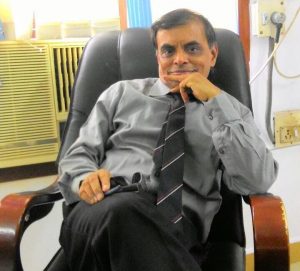India – China. The ‘bhai bhai’ relations!

Baskaran Krishnamurthy
A thousand years? It is much more. India and China have been in close interaction with each other for more than 2000 years. But there is nothing strange in it since the two countries between them possess a very long history of trade and culture that date back to a period of many centuries B.C.
The Indo China region is one of the most ancient commercial corridors in its real sense. The coastal areas of India, both on its East and the West, were brimming with trade activities all along – from time immemorial. Unbelievably, the ancient Indians, particularly the Tamils, could establish trade contacts with people from far off countries.
While we have elaborate descriptions of trade practices of Tamils with ‘foreigners’ in the Literature, there does exist a certain element of ‘fantasy’ in it that defies logic and there surely is the lack of a documentary proof of a sound, concrete economic relations between two geographically far off communities.
The ethnic and cultural interactions were minimal or nothing too in those days because of a near total absence of any means of travel, leave alone transportation, over the vast area of Sea. Until the advent of steam engine, any travel over the Sea was more of an ‘adventure’ rather than a commercial venture. When that was the case, all the ‘proud’ descriptions of a ‘trade’ between two far off countries could only have been an ‘invention’ planted in imagination and nothing more.
Yet, the interaction between India and China could have been more real than imaginary since there was, and is, never any ‘barricade’ that separates the India – China region. ‘Road trade’ was always possible and this has not been denied by any one from any quarter. This is only to re-establish the fact that our relations are really very old and that there were never really serious fights between us for so long a period. All the ‘rifts’ and misunderstandings are of recent origin only. We have to look at the India – China relations keeping this ‘history’ of cordiality in mind.
The visits of Bodhidharma to China and Xuanzang to India subscribe to the view that there were indeed frequent interactions between Indians and Chinese. But it would be more prudent to treat them as isolated, individual visits rather than as one representing two nations. Peoples of different countries living side by side prefer to live harmoniously and this tendency remains even today. They are the people who really keep normal relations and are the ones who interact with each other.
One to one relation or one’s visit to a nation in pursuit of something does not hold much in terms of ‘foreign relations’. In fact all these ‘sanctions’ and ‘restrictions’ were not there in those days when the reported visits took place.
Buddhism had a major role in the improved relations and it brought many students and scholars to India who wanted to ‘explore’ and experience rather than helping to build relationship between two communities. In fact, Buddhism could not ensure peace even among the present day Buddhist nations.
Religion has not been able to provide as much in terms of Peace and harmony as it paved way for grave wars and mass killings and as it could be seen, religion has not been able to ‘unite’ people of different regions or countries ever. If by any chance it could be so, there would have been no war, no fight or no conflict in the entire Arab region. It is all about politics and power; nothing to do with the Faith.
Anyway, let us leave aside all the ‘historic’ references and move on. It was during the Opium Wars and during the Word War II in 1945 that India and China came closer to guard themselves against the victorious ‘imperial’ march of Japan. Today, China is hostile to India whereas Japan is an important ally!
The diplomatic relations in its real sense, started in 1950 when India recognized the People’s Republic of China on the 1st January 1950 as an independent sovereign State. India was the first non-communist nation to accord this status to China.
The issue of Tibet was the initial point of dispute with China claiming it to be its own territory demanding India to stay away from the ‘Freedom of Tibet’. Ironically, India did not utter a word against China’s stand and readily agreed to refrain from any movement or agitation that sought Independent Tibet. In a way it was a great betrayal by India which left nobody in the world to support the legitimate rights of the Tibetans.
Jawaharlal Nehru believed that India’s relations with China would be of more benefits to the entire region and that by taking a pro-China stand, we would be able to have a conflict free zone allowing us to spare our efforts in building a new India. It was agreed in principle that Tibet was an internal issue of China and that if at all they need a separate sovereign state of Tibet, the Tibetans had to sort it with the Chinese government on their own. Thus the most ‘trusted’ ally of Tibet washed its hands off. India in fact played a major role in the signing of agreement in 1951 between China and the Tibetan leaders wherein the sovereignty of China over Tibet was fully agreed upon. That was in effect the end of the ‘struggle’ for Tibet.
In the early 1950s, the phrase ‘Indhi – Chini – bhai – bahi’ became so popular that the common man in Dia did really believe that Indians and Chinese were brothers. In this background, came the ‘Panchsheel’ Agreement in 1954 that called for restraint by either country. Peace, non-aggression, non-interference in the internal issues and respecting the sovereignty of each other were the goals of the agreement.
There was indeed nothing great about this agreement except that Nehru genuinely made an attempt to maintain a peaceful, cordial relations with the neighboring country so that he could spare all his efforts for the developmental work.
International relations do not get strengthened by mere wishes and aspirations. Nehru’s readiness to extend to anyone and everyone failed to convince Mao Zedong of China. India had to suffer a crushing war in 1962 when China blatantly violated the agreement, resorted to unprovoked aggression and invaded many parts of north eastern India. Nehru was caught unaware of China’s evil designs that left him in state of utter shock and disbelief. India then was trying to recoup its forces after the conflict with Pakistan and the unpreparedness for a full fledged war had its toll too.
China inflicted heavy damage and loss to India with whom it had signed the Panchsheel agreement that speaks against any form of aggression. But, this has been the ‘principle’ of China – to be unprincipled and unethical in its words and deeds; to be unreliable and untrustworthy in its relations with others.
China is perhaps the only country in the world that does not attach any importance to ‘credibility’ and is again the only one – never to care for the rights of its own citizens too. The Tiananmen Square massacre on 4th June 1989 is perhaps the bloodiest attack by a government on its citizens but no country in the world came forward to condemn, leave alone punish, the Communist government of China for its inhumane attacks on the innocent students who were literally bull dozed by the Chinese forces in broad day light very much in the presence of the public. The Communist China strongly believes that ‘fear psychosis’ among the people is the most effective weapon to keep the nation ‘trouble free’.
The utter disregard of China towards the civil rights and democratic principles is never less known to the world; yet, China is never reprimanded and is allowed to escape from any action against it by the United Nations with the help of Veto power it enjoys as a permanent member of the Security Council.
Frequent intrusions of China into the Indian territories on the North East continue unabated till date and the Doklam issue in 2017 was yet another instance of deliberate attempt of aggression by China over India. This time however China could not succeed so much because India is not the same as it was in 1962. China was made to realize that as an equally powerful and as a fully equipped Force, India is not a push over anymore. The orchestrated and motivated retaliatory attack by the Indian camp forced China to retreat from its occupied positions on the Indian side.
Post – Doklam, China has started moving towards a conciliatory approach in matters of dispute with India. As the fastest growing ‘big’ economy in the world, Indian Market offers huge opportunities to countries like China who are ready to exploit the consumerist behavior of the upcoming Indian middle class. Economic interests have tilted the scene of bilateral relations clearly in favour of India.
There have been enough indications in recent years that the Chinese economy is not as strong as it is presented by the Communist China and that it is in fact facing a gradual downfall that may lead to unrest and ‘uneasiness’ within. Reports are coming out from the Communist China that the students of various Universities are grouping together to form Students’ Union and as expected, the repressive Communist government is ‘lifting’ these trouble making youth who subsequently go ‘missing’! ‘the Tiananmen days are back again daunting the Communist regime day in and day out.
India on the hand, in spite of internal squabbles, moves ahead as a strong, vibrant democracy and slowly emerging as the 3rd largest economy in the world. The growth does not seem to be slowing down and is bound to keep more pace in its glorious stride as a Nation full of hopes and promises.
India and China are now in a ‘win – win’ situation where it is – ‘advantage India’.
Author – Baskaran Krishnamurthy, Writer, Columnist & Income Tax officer




























 WhatsApp us
WhatsApp us
Pingback: how to tell if a tag heuer carrera is real or fake formula 1
Pingback: Legal document preparation
Pingback: They drown 롤대리사이트 after Alabama under 롤 승률 right now.
Pingback: speedy plumbing
Pingback: 먹튀폴리스
Pingback: cbd oil side effects on kidneys
Pingback: buy/order Dixie Elixir Dew Drops Tinctures online use for pain, anxiety, sleep for sale near me bulk in usa uk nz canada australia overnight delivery
Pingback: taxi to airport from cheltenham
Pingback: Buy Marijuana Online
Pingback: Small child
Pingback: https://immediate-edges.com
Pingback: sell car
Pingback: rolex replika
Pingback: Regression testing meaning
Pingback: Medion AKOYA E6234 manuals
Pingback: bandar 77
Pingback: legit dumps shop 2021
Pingback: p3k 2022
Pingback: sellswatches.com
Pingback: Urban Nido
Pingback: Independent Villas for Sale in Hyderabad
Pingback: keto fats
Pingback: gay dating 97206
Pingback: blue meanie mushroom
Pingback: https://everyonezone.com/read-blog/50996
Pingback: nova9
Pingback: Anonymous
Pingback: Opettaja Seksi Porno
Pingback: can i sell my replica rolex picture
Pingback: buy henry rifles
Pingback: reseñas google
Pingback: maxbet
Pingback: Why didn’t Charter Spectrum do pre-employment verification on their technician that murdered this elderly woman?
Pingback: สล็อตเว็บตรง
Pingback: passive streams of income
Pingback: pour les détails